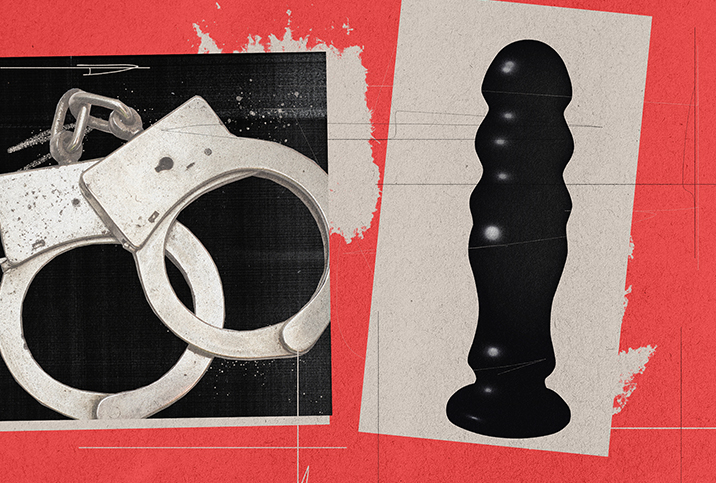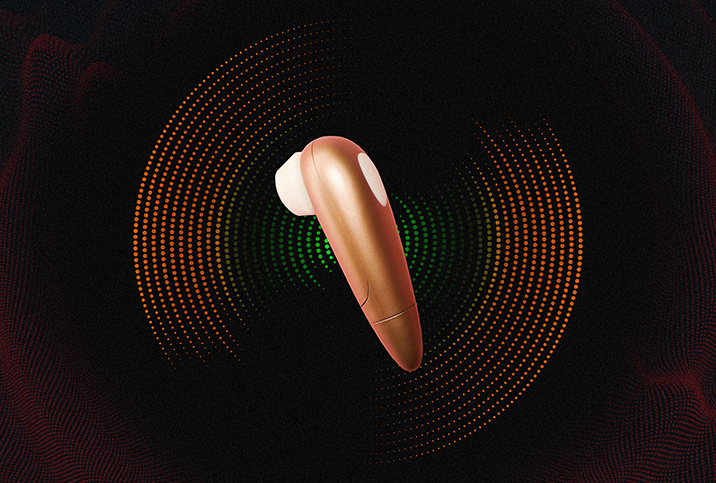When Owning a Dildo Was a Crime

It may not be top of mind when you're doing it, but anyone enjoying penetrative solo play is masturbating on the shoulders of giants.
Our predecessors accomplished a ton so we could have the lives we enjoy, and the saga of how the dildo emerged from its once illegal paraphernalia status to an oft-used product delivered to your doorstep is no different.
Criminalizing sex toys in America
"The first big anti-sex toy legislation is in the 1800s," said sex and gender historian Hallie Lieberman. "[In] 1873, Anthony Comstock, the head of the [New York] Society for the Suppression of Vice—which was this religious-vice organization—went on a campaign against pornography, contraception and masturbation. The United States Postal Service hired him as a national postal inspector. His job was to look through every magazine [for] contraceptive ads and sex toy ads. He would go after sex toy companies, arrest people and he would burn or melt the devices."
Back in the day, the umbrella term for vice included violent crimes, illegal drugs and sex for any reason other than reproduction. As a result, at the turn of the 19th century, employees for sex toy companies lived in fear they would be jailed and their inventory destroyed by federally backed religious zealots. Lieberman deduces that, as the Jewish population never exceeded 4 percent of New York City's total populace but constituted 32 percent of the arrests Comstock made, religion and discrimination were major factors in this purge.
In the same way that a category as vast as "vice" puts violence on par with masturbation, the official language used for sex toys was equally vague. Colloquially referred to as "French ticklers," Comstock preferred to label sex toys or contraceptives as "immoral rubber goods."
Lieberman attests that in private reports of items confiscated, Comstock did use the word "dildo" instead of his typically sanitized language reserved for official reports. The specificity of the legal language remains vague to this day—especially in the category of vice—allowing for murky generalizations, which may often lead to confusion and, ultimately, some unpleasant consequences.
The threat of the dildo
Much of the stigma around dildos stems from the perceived threat they posed to the heteronormative patriarchy. By this thinking, a woman shouldn't be able to penetrate herself or others because that was a man's place. Even as laws and attitudes around sex toys loosened, Lieberman explained, the growing tolerance operated with the same values as before.
"In the 1960s, you could sell a dildo as a marital aid," Lieberman said. "It was to be used by a man who has impotence to have sex with his wife. [But if] I sent a catalog through the mail to you [and] you're offended by it, you [could] call the postal inspector. And they sent a letter to me, the maker of the catalog, saying, 'If you don't stop sending it to this individual address, you're going to go to jail.'"
Cultural anthropologist Esther Newton further outlines the gender gap of the time, particularly in the case of criminalizing same-sex relations. While male homosexuality was ubiquitously outlawed, the situation concerning women was less consistent.
"In America, every state had its own sodomy laws," Newton said. "All 48. Some included women and some did not....Usually, historically, when women got in trouble, it was because they were caught or suspected of having something like a dildo, that they were using it to 'appropriate the male prerogatives.' It was phrased like that."
High-profile legal cases (like Miller v. California in 1973) weakened Comstock's legacy by redefining obscene materials from "utterly without redeeming social value" to "work, taken as a whole, [that] lacks serious literary, artistic, political or scientific value." Thus, sex toy raids were replaced with consumer watchdogs, the hope being those "good samaritans" would safeguard society against sex toys.
Near the 21st century, sex toys could finally be sold in stores, but their packaging and labeling were highly censored.
It's all better these days—almost
Nowadays, sex toys can be sold in every state except Alabama. A 1998 anti-obscenity law in that state bans the distribution of any item "marketed as useful primarily for the stimulation of human genital organs."
Lieberman said such legal loopholes can be almost as difficult to navigate as outright banning.
"[In] 2008, in Texas, there would be blacked-out lines on a sex toy package where it said 'dildo' or 'vibrator,'" she said. "Until 2018, in a suburb of Atlanta [Georgia], it was illegal to sell and purchase sex toys. Someone with multiple sclerosis sued the city and got that overturned. How most states regulate now is through zoning laws—you cannot have a sex toy store within 500 or 1,000 feet of a church, school [or] park. You're pushing sex toys outside of the city center into areas that are frequently not safe, that women alone are not going to feel comfortable going to. If...20 percent or more [of total inventory] are sex toys, the whole thing is a sex toy store. Police are going there counting the number of sex toys, literally, this last year."
Much of the stigma around dildos stems from the perceived threat they posed to the heteronormative patriarchy.
Besides the bizarre outrage that your tax dollars are paying for police to spend days counting dildos, these realities are odd and vaguely chilling. Silence fueled by shame is its own danger. A lack of transparency can hurt everyone, not just the drastic case of a woman living in pain having to take on the legal system for the right to her own body. The legislatively encouraged shame surrounding sex toys is shockingly contemporary.
The subsequent effect of strangling the sex toy industry is that for much of the field's history, there has been no space for regulation. Because a legal loophole allowed sex toy companies to offer their products as "novelty items," those companies were exempt from the kind of testing that foods and medicine undergo before entering a human body.
The first international certification board for sex toys was only established earlier year, in September 2021. To offer unsafe sex toys isn't all that different from outlawing sex toys—no one can prevent masturbation, but masturbating safely can be legislated. And as the vagina is composed of highly porous bodily tissue, what you masturbate with matters.




















